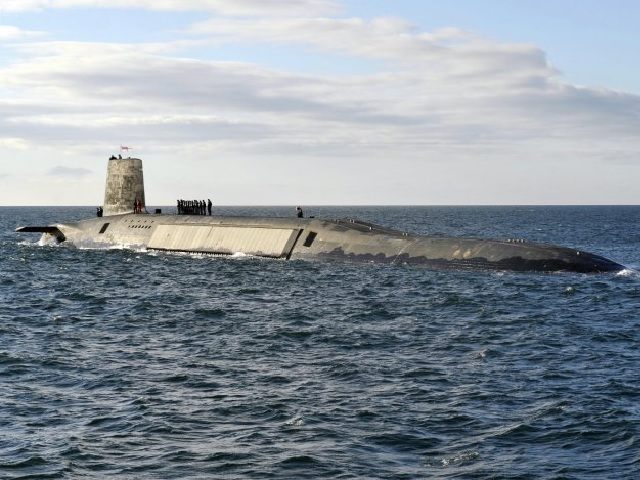LONDON, July 18 (Reuters) – Lawmakers are expected to vote on Monday to renew Britain’s ageing nuclear weapons system, a multi-billion pound project regarded as key to maintaining the country’s status as a world power following its vote to leave the European Union.
Parliament, where the Conservatives have a majority of 16, is likely to approve renewing the Scottish-based nuclear-armed Trident submarines despite opposition from some lawmakers from the main opposition Labour Party and the pro-independence Scottish National Party.
Opponents say the vote is being used by the newly appointed Prime Minister Theresa May to unify her party after a bruising Brexit campaign and embarrass Labour by highlighting its own deep divisions.
In her first statement in parliament as prime minister, May urged lawmakers to back Trident, not only to protect Britain from growing threats from Russia and North Korea, but also to protect jobs in Scotland and elsewhere.
“What this country needs to do is to recognise that it faces a variety of threats and to ensure we have the capabilities that are necessary and appropriate to deal with each of those threats,” she said.
Britain needed to retain a nuclear deterrent which had been an insurance policy for nearly 50 years, May said.
Parliament agreed in principle in 2007 to replace the deterrent system and Monday’s vote is to rubber stamp the decision to go ahead with approving the building of four submarines to ensure Britain can have nuclear weapons continuously on patrol at sea.
UK’S “OUTSIZED” ROLE
U.S. Defence Secretary Ash Carter said in February that Britain must renew the submarines, based at Faslane in Scotland, if it wanted to maintain its “outsized” role in world affairs.
However, some in Labour believe the weapons are no longer needed as they are little use against terrorists and the money could be better spent elsewhere.
Labour leader Jeremy Corbyn, who has been challenged by two candidates seeking to take the helm of the centre-left party, questioned the need for Britain to possess “weapons of mass destruction” and said it should press for a nuclear-free world.
“I make it clear today that I would not take a decision that kills millions of people, I do not believe the threat of mass murder is a legitimate way to go about dealing with international relations,” said Corbyn, who had indicated his lawmakers could vote freely on Trident.
The party’s foreign affairs spokeswoman accused May of “playing games” with the issue and said she would abstain.
“Theresa May talks about it being reckless for us not to vote today. I think it is reckless to plough on ahead with the most expensive of all the various options,” lawmaker Emily Thornberry told BBC radio.
Some military officials also oppose the outlay on Trident, saying the money would be better spent on maintaining the army and on more conventional technology, both of which have recently suffered cutbacks.
The Ministry of Defence has said replacing the four submarines would cost 31 billion pounds ($41 billion), plus a contingency fund of 10 billion pounds, with another 4 billion already allocated to the design process.
Defence firms BAE Systems, Rolls-Royce and Babcock can expect to benefit from a renewal, with the new submarines expected to enter service in from 2028.
Defence Secretary Michael Fallon said a vote for Trident would allow Britain to get on with building the boats and give the supply chain confidence that the project would go ahead.
However, in response to a freedom of information request from Reuters in March, the ministry said it could not provide details of the costs for the nuclear warheads, support services infrastructure and running costs over the system’s expected life.
Calculations by Reuters and Conservative lawmaker Crispin Blunt suggest that it could reach 167 billion pounds ($220 billion) over 32 years.
Blunt, the head of the parliament’s foreign affairs committee, said on Monday the costs had increased and may eventually reach 180 billion pounds.
“I oppose the renewal of Trident because I care about the security of my country,” he said in a statement. “I’m not prepared to be party to the most egregious act of self-harm to our conventional defence.”

COMMENTS
Please let us know if you're having issues with commenting.